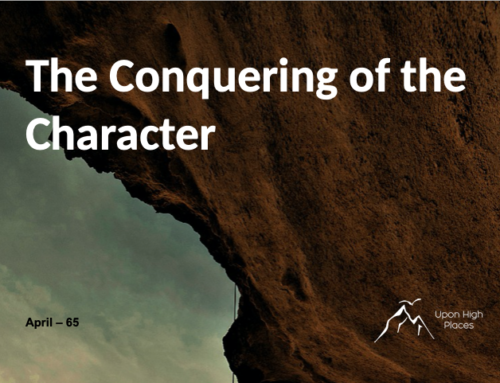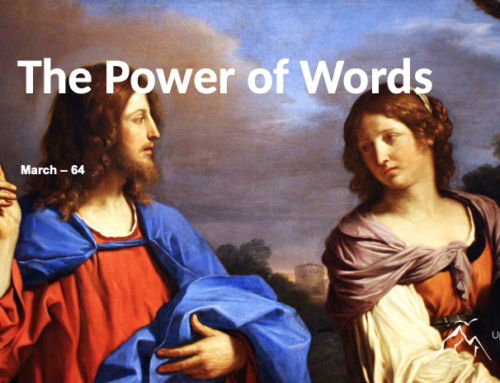In the Potter’s Hands
September 2020
My dear youth:
I greet you in the name of the Lord Jesus Christ and ask that His blessings, love, and guidance be upon you in abundance.
Laws established by God
The apostle Paul mentions a law, “for whatever a man sows, that he will also reap.” Galatians 6:7. It’s impossible to plant tomatoes and to harvest cucumbers. God established physical laws that are inalterable, and it has been so since the beginning of the world.
The apostle cites this law of sowing and reaping to remind his brethren that the same law exists in the spiritual world, “For he who sows to his flesh will of the flesh reap corruption, but he who sows to the Spirit will of the Spirit reap everlasting life.” Galatians 6:8.
The immutability of divine laws
One of the characteristics, as we already mentioned, of the laws established by God is its immutability. This is due to the fact that God doesn’t change, “with whom there is no variation or shadow of turning.” James 1:17. This is good news for us as humans because as God is love (1 John 4:7) and gave us his only begotten Son Jesus Christ so that whosoever believeth on Him doesn’t perish but have eternal life (John 3:16), we can look to the future with hope despite our mistakes.
We shouldn’t worry whether tomorrow the Lord will continue loving us, if He will continue to help us improve our character, if He will forgive us our sins, and if He will continue to hear our prayers. No, dear reader, “God is the same yesterday, today, and forever” and we can still cling to his infinite goodness and mercy knowing that if we reach out to Him, He won’t reject us, “All that the Father gives Me will come to Me, and the one who comes to Me I will by no means cast out.” John 6:37.
But we shouldn’t forget that the laws that God established in the natural world and in our being continue their unchanging course. What does this mean? That if I decide to sin, I will reap death (Romans 6:23); if I don’t repent and I stubbornly cling to evil. If I choose to work against the divine will, I will reap the consequences in my spiritual and physical life. For example, if I decide to get high, those substances will have effects on my brain and the rest of my body, and God will not prevent them even though He loves us infinitely.
The law of correspondence
A law similar to sowing and reaping would be the law of cause and effect and even the law of correspondence. The first law tells us that every action generates a reaction, that is, I receive that I give and everything that proceeds from me returns to me unfailingly; my thoughts, my intentions, my attitudes, and my words today are the result of my future. The same occurs in the law of correspondence. Through this law we know that whatever happens is the result of freely exercising our responsibility. Some express it by saying that the reality we live is what we deserve.
It isn’t flattering, and Jesus taught it. He said that every plant gives its fruit, “Do men gather grapes from thornbushes or figs from thistles?” Matthew 7:16. Our sinful nature leads us to evil, we are trees that produce bad fruits by nature, and Jeremiah the prophet states it, “Can the Ethiopian change his skin or the leopard its spots? Then may you also do good who are accustomed to do evil.” Jeremiah 13:23.
A new heart
But there are good news in the gospel and it’s that if we decide to act according to divine will, a change will take place that can’t occur naturally in us nor in the physical or spiritual world of the human being, since there clearly are laws. But, as we said, there are good news. The Bible teaches us that God is constantly calling every sinner, including you and me. He challenges us every day through the word of the Holy Spirit, and His work is to knock at the door of our heart and mind, and convince us of our chaotic situation so we seek help from God, “And when He has come, He will convict the world of sin, and of righteousness, and of judgment.” John 16:8.
Humanity has tried to give answers through philosophy, atheism, agnosticism, science, false religions, and other perspectives, but without any results. Things remain unchanged. We humans have turned our backs on our Creator by seeking solutions where there aren’t any, water where we can only find deserts, life where there is only death. Jesus says, “But you are not willing to come to Me that you may have life.” John 5:40.
The majority of people, actually we all know that something isn’t right in our hearts; it’s evident because of who we are, because of our way of reacting and thinking, as we are full of defects. This is the consequence of the transgression of the natural divine laws we cited. God told Adam and Eve that the day they ate of the prohibited fruit they would die (Genesis 2:17). They decided to eat, and both they and their descendants reaped the consequences. Today, the world continues to eat from the prohibited fruit, and anyone realizes that this is so. It’s enough to look around us to see that humanity continues to sink into its miseries.
But God loves us so much that He gives us His Holy Spirit. When someone decides to surrender their heart to Christ and accepts Him as their personal Savior, they in turn receive God’s Spirit that will work in their lives. Here’s an example, clay in its natural state is a formless and inert matter; but if the potter takes it, places it on a wheel, spins it, and forms it with his hands, it becomes a useful vessel.
In the book of the prophet Jeremiah we find a very encouraging teaching for every human being. The prophet compared God with a skilled potter and the people of Israel with clay, you can read it in Jeremiah 18:1-6. What’s interesting of this text is that it has a universal application, it also reflects our situation. Every one of us is that clay in the hands of the divine potter if we so wish to be. What can happen if we decide to be clay in the hands of God?
A slow process
If we let Him take us and place us on His wheel, a deep process of transformation will begin through His great mercy. We are transformed from vile material to a vessel of honor because the heavenly potter molds us in the image of the Lord Jesus. It isn’t a matter that is visible overnight or in a moment, it takes time; in the Bible this time is known as “sanctification”.
It isn’t an easy task to transform a human heart, only God can do it. If we let God mold us, it doesn’t mean that we are preventing the results of the error of our ways, but He does promise to throw our sins into the depths of the sea and forget about them (Micah 7:19). He will give us a new heart that lives to serve and love God. Then we will live in harmony with the divine laws to reap the rich blessings of the Lord. To sow love, understanding, kindness, mercy forgiveness, compassion, benevolence… to reap a harvest of the same nature.
Let’s consider the case of the apostle Peter. It’s a perfect illustration of the type of person that no one wants to be⎯talkative, hot-headed, conceited, impulsive, hurtful… In short, a coarse and rough man much like clay. But he permitted God to take and place him on His wheel. Every spin and every touch polished him; sometimes he suffered alone, and his pain was terrible when he denied the Lord Jesus. But Peter permitted the Spirit to work on him on the heavenly wheel. And he finally reflected the character of his Master. Jesus entrusted him with the flock once converted. Such is the work of the Lord.
Conclusion
Letting ourselves be led by our sinful nature will destroy us, it will make us unhappy, and separates us from our Creator. Everything we can produce is unpleasant noise, dead works, an empty life and without fruits, a harvest of death. But if we decide to place ourselves in the hands of the divine potter, the Holy Spirit will work from the inside out and will enable us to reflect the image of Jesus and produce its fruits. I encourage you to permit God to take you and place you on the heavenly wheel so that He can mold your heart until you become a useful vessel for the glory and honor of God, for your joy and your neighbor’s. God bless you. Amen.
José Vicente Giner
Pastor and Youth Department Leader
of the General Conference
For meditation:
- Discuss the sinful nature of the human being.
- How can the Lord carry out a work of transformation in our sinful hearts?








